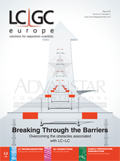2018 Sample Prep Summer Course
The 2018 Sample Prep Summer Course will take place in Chania-Crete, Greece, on 22–24 August 2018.
Photo Credit: Paopano/shutterstock.com

The 2018 Sample Prep Summer Course will take place in Chania-Crete, Greece, on 22–24 August 2018.
There has been a boom in the number of sample preparation techniques available. Although there have been major technological and scientific achievements in sample preparation, most advances have been communicated in the context of “simplicity” and “applications” and this has led to the misconception that “sample preparation is simple and there is no theory to it”, according to the organizers.
The second meeting of this theoretical and practical sample preparation event focuses on solid-phase microextraction (SPME) and liquid-phase microextraction (LPME). The course has been designed for anyone who is either new to microextraction or wishes to expand current knowledge and understanding about the technique as a whole. During lectures and “hands-on” training, six leading experts in the field will explain why microextraction is more than just a few “simple” procedures. They will help participants understand the underlying theoretical principles and teach them how to use these principles to produce better results in the laboratory. The event aims to raise awareness, not just for the science of microextraction and its application, but also the need to achieve erudition at it.
The course starts on Wednesday 22 August at 9.00 a.m. with Doug Raynie from South Dakota State University, USA, overviewing sample preparation methods and presenting the general principles. Janusz Pawliszyn from the University of Waterloo, Canada, will put solid-phase microextraction on the spot and present the SPME formats and sorbents next to the theoretical principles underlying each technology. Elia Psillakis from the Technical University of Crete, Greece, and Stig PedersenâBjergaard from the University of Oslo, Norway, will then take over and define LPME and liquid membrane extraction techniques. The principles behind liquid-phase–based extraction methods will be explained and related to those presented earlier. In the afternoon session, laboratory training is scheduled, and participants will get valuable hands-on experience in the fibreâformat of SPME and the effect of experimental conditions on SPME performance.
The second-day lectures will begin with a more in-depth presentation of SPME. Ezel Boyaci from Middle East Technical University, Turkey, will explain method optimization in detail and Gangfeng Ouyang from Sun Yat-sen University, China, will present the critical stage of calibration. Coverage will continue with Barbara Bojko from Collegium Medicum Nicolaus Copernicus, Poland, who will discuss the approaches to process the different types of samples and show how to perform specialized tasks like in vivo sampling. Janusz Pawliszyn will conclude these morning lectures by presenting SPME coupling strategies to gas chromatography (GC), liquid chromatography (LC), and mass spectrometry (MS), automation, and future directions. After lunch the second laboratory exercise will take place; this time participants will get hands-on training in bio-SPME sampling from complex samples and calibration practices.
On the last day, lectures will begin with Elia Psillakis presenting a variety of twoâphase LPME setups. She will use theoretical models to visualize the extraction process and the effect of experimental conditions on extraction. Coverage will continue with common and “new” liquid acceptor phases. Stig PedersenâBjergaard will move the discussion in three-phase LPME, electromembrane extraction, and parallel artificial liquid membrane extraction (PALME). Lectures will conclude with automation potential of liquid-phase–based techniques and a discussion on the future directions in the area. At all stages, the sample type and characteristics will be taken into consideration next to the “green” and cost-related aspects of each method. The course will close with the last set of laboratory exercises covering a wide variety of two- and three-phase LPME methods.
For more information, please e-mail: sampleprep2018@enveng.tuc.gr or visit: www.sampleprep2018.tuc.gr

Altering Capillary Gas Chromatography Systems Using Silicon Pneumatic Microvalves
May 5th 2025Many multi-column gas chromatography systems use two-position multi-port switching valves, which can suffer from delays in valve switching. Shimadzu researchers aimed to create a new sampling and switching module for these systems.
Studying Cyclodextrins with UHPLC-MS/MS
May 5th 2025Saba Aslani from the University of Texas at Arlington spoke to LCGC International about a collaborative project with Northwestern University, the University of Hong Kong, and BioTools, Inc., investigating mirror-image cyclodextrins using ultra-high performance liquid chromatography–tandem mass spectrometry (UHPLC–MS/MS) and vibrational circular dichroism (VCD).

.png&w=3840&q=75)

.png&w=3840&q=75)



.png&w=3840&q=75)



.png&w=3840&q=75)











